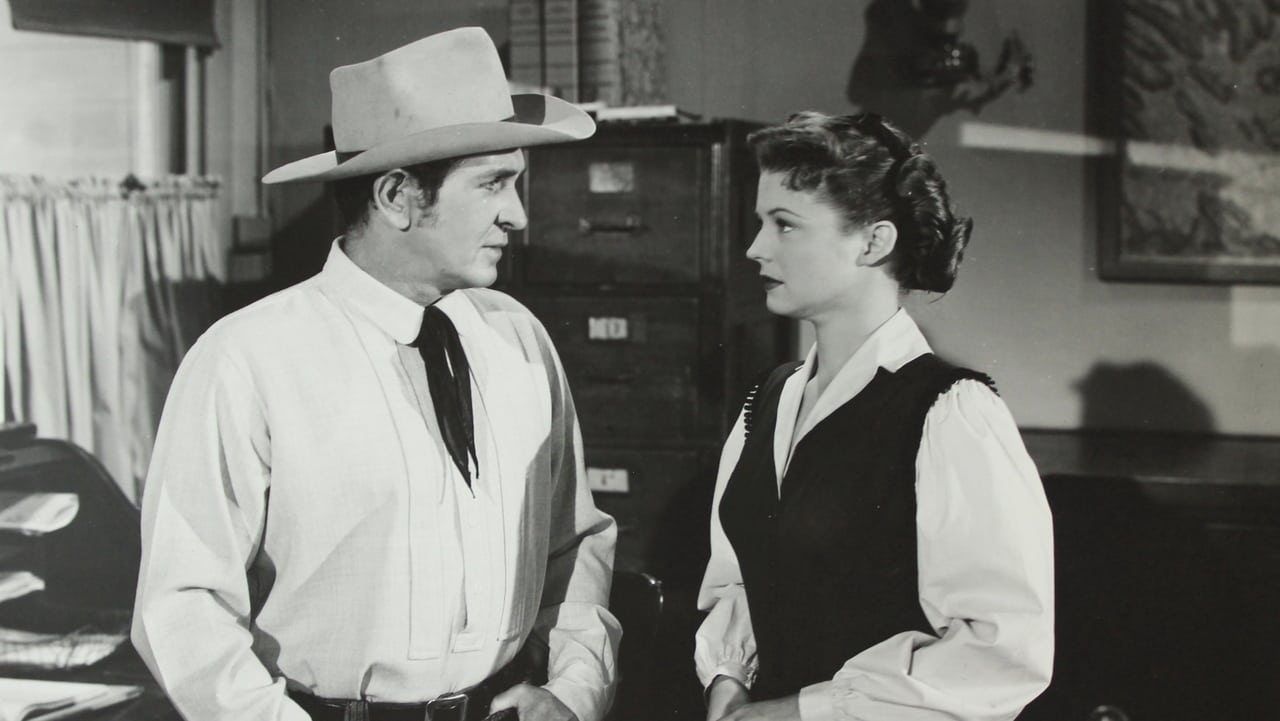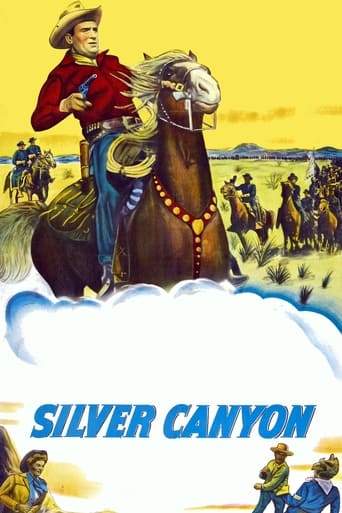

Too much of everything
... View MoreOne of the best films i have seen
... View MoreBad Acting and worse Bad Screenplay
... View MoreThis is a small, humorous movie in some ways, but it has a huge heart. What a nice experience.
... View MoreIt is 1861, and the Civil War has begun in the East as Pony Express riders bring news of distant battle fronts. Fighting eventually moves West in the form of Confederate guerrilla warfare. The Confederate leader, played by Jim Davis, is Wade McQuarrie (obviously a take on Quantrill). At the town of Ft. Aldridge, jittery townsfolk try to hang Doc Seddon as they incorrectly believe he is in collusion with McQuarrie. Gene Autry arrives in time to stop the hanging, but an unfair fight ensues, with the odds against Autry. Pat "Lash" Buttram, finally becoming useful in a brawl, uses his whip to good effect. Then swinging from a rope, he evens the odds when he knocks down a bunch of the rowdy fellows. Meanwhile Gene more than holds his own. The riot over, Union Major Weatherly addresses the group as President Lincoln has called for more volunteers. Thinking that Gene has enlisted, Pat joins the army. Actually the major discourages Gene from enlisting as he feels he can do more good by searching for McQuarrie. Pat deserts to join Gene, and remains a deserter almost to the very end. Meanwhile McQuarrie's forces attack a small Union wagon train containing silver from the Comstock Lode. Eventually the loot is taken to McQuarrie's cave hideout. Along the way we meet up with characters like Dell Middler (Gail Davis) and Laughing Jack. In the town of Gateway, Gene is introduced to Colonel Middler; previously he had met his daughter Dell under unusual circumstances. Also he meets Dell's brother Walt (Bob Steele), who is a Confederate sympathizer (unlike Dell). Gene and Pat ride to the Double D ranch, where some of McQuarrie's men are raiding. Gene shoots a raider who tried to kill a Pony Express rider, who happened to be in the area.Around the half-way point of the flick (37-minute mark), a newspaper headline states that Confederate General Lee has ordered all guerrilla units to disband. McQuarrie is now branded as an outlaw. This kills his hopes for a commission in the Southern Army. McQuarrie, though, still hopes that his successes will convince Lee to change his mind. McQuarrie's men, dressed as union soldiers, get into a brawl with Gene and Pat, who are arrested. With the help of Doc Seddon, they are freed from the hoosegow. Around the 60-minute mark McQuarrie's men, in disguise as federals, raid Gateway. Their main goals are the town bank, the jewelry shops, and general stores. Gene's ruse helps drive them off. Then Gene's posse trails the raiders to their cave hide-out, where a big gunfight ends in a massive explosion. Maybe superstitious Pat's bag of tricks help after all! Gene's movies with Columbia are longer than those with Republic. Also, the later westerns tend to focus more on the historical – rather than the contemporary – West. They tend to tell a "straight" story. Unlike movies like "The Old Barn Dance," "Rancho Grande," or "Stardust on the Sage," we see less singing and almost no dancing. Personally I prefer Pat Buttram over Smiley Burnett, even though the latter wrote songs and played musical instruments. Buttram was a better comedian, and had that famous gravelly voice. He may even have been a better horseman. Overall, this feature is one of Gene's finer later efforts.
... View MoreThis one has all the look and feel of one of Gene's TV Westerns, not surprising since it was made during that show's run. Gene and Pat use their real names in the story, and Gail Davis also appears as Dell Middler, daughter of a Union Army Colonel. It's set in 1861 at the start of the Civil War, but that conflict has minimal bearing on the story. Instead, Rebel sympathizers under the leadership of Wade McQuarrie (Jim Davis) conduct raids on Federal supply lines, stealing silver and rustling horses to disrupt the Union cause. Gene and Pat Buttram are sympathetic to the Union and both intend to enlist in the Army. However Major Weatherly (Stanley Andrews) convinces Gene he would better serve his country by trying to uncover McQuarrie as a civilian. Trouble is, while this was going on, Pat actually does enlist, so he winds up being a deserter when he tags along with his pal!I got a kick out of Pat Buttram with all his knick knacks, a rabbit's foot, shamrock pins and other assorted trinkets to bring good luck. He almost got waylaid by crossing paths with a black cat, but managed to counteract the incident with a ritual of his own. Pat and his horse decked out in camouflage was also a nifty touch.There must have been something about sending the movie's hero to the guardhouse to make him break out in a song. The same thing happened with Roy Rogers in the 1939 film "In Old Caliente". Both cowboy heroes managed to keep their good humor and spirits in stride, knowing that the good guys always win. This one is a bit unusual however; even though McQuarrie is eventually fingered by Gene in the guise of the phony Captain Fleming, all the bad guys meet their end buried under an exploding mountain rock pile - McQuarrie should have had a rabbit's foot!
... View MoreGene Autry stars in this 1951 Sepiatone western set in the aftermath of the Civil War. Gene is sent to corral a Confederate grill and runs into a passel of trouble. The great Bob Steele has a great role here as a secret supporter of the out of control grill forces.Autry was not the greatest actor nor singer in westerns, but he was capable in all areas and always turned out a quality product. This role is well suited to his abilities and he is fun to watch in this oater. Gail Davis was a regular in his films, always turning in a great performance.A fun, but standard western programmer.
... View More"Silver Canyon" is a dandy example of the Saturday matinée features Hollywood cranked out after World War II. Autry, as himself, takes on the bad guys with cool courtesy and a ready song. There's the plucky girl, the comical sidekick, the climactic shoot-out, and the Lee Van Cleef of his time, Bob Steele, lurking evilly behind the rocks. The cowboy hero archetype, taken from 19th century dime novels, played well to post-war America, and has become the equivalent of the Japanese samurai or the European knight for us. There's no confusion here... right is right and wrong is wrong.This type of 70 minute second feature translated easily to the small TV screen so the '50's and '60's saw a profusion of derivative hour and half-hour westerns, such as "Rawhide", "Have Gun Will Travel", and "Gunsmoke". One of those featured "Silver Canyon"'s Gail Davis in 80 episodes of "Annie Oakley". Many boomers will also recognize the cast's Jim Davis from "Rescue 8" or "Dallas", and the inimitable Pat Buttram from "Green Acres".The formula westerns of the era, and "Silver Canyon" in particular may not be the stuff of critic's dreams, (and Gene Autry singing jailhouse blues may not be the most evocative) but they constitute an unpretentious view of the world as we wanted it to be after decades of Depression and war.
... View More